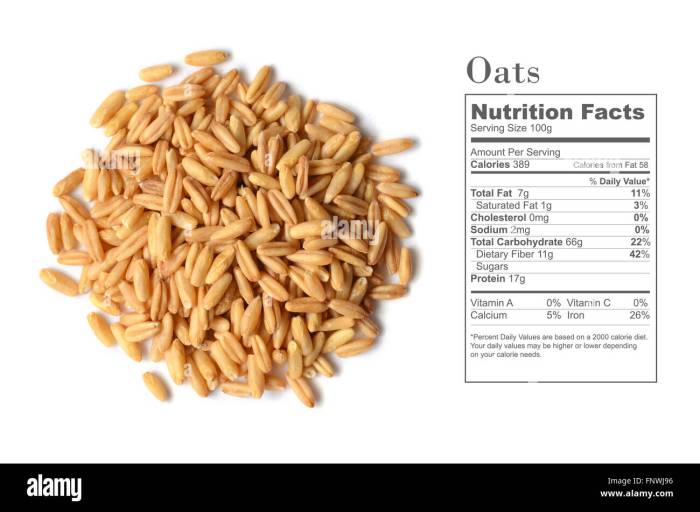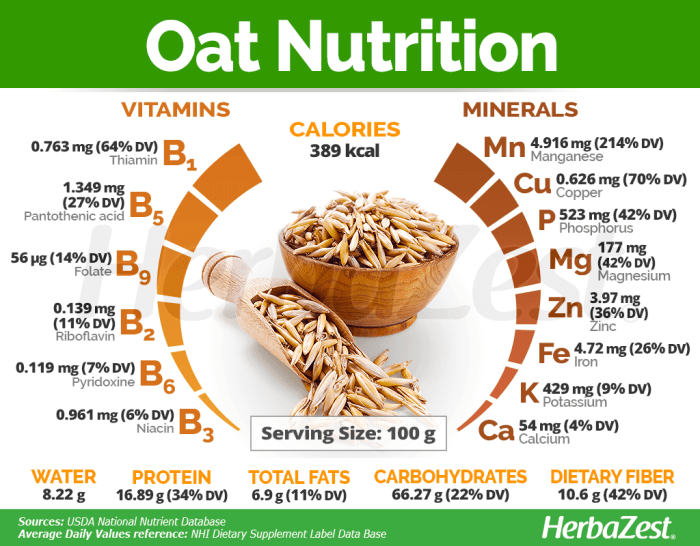
Nutritional Composition of 1 Cup of Oats: 1 Cup Of Oats Nutrition Facts

1 cup of oats nutrition facts – Yo, let’s break down the nutritional power packed into a single cup of dry oats. We’re talking serious fuel for your body, my friend. This ain’t just breakfast; it’s a nutritional powerhouse.
Okay, so you’re checking out 1 cup of oats nutrition facts, right? That’s a solid breakfast move. But hey, sometimes you crave something a little… spicier. If you’re thinking about adding some Old El Paso flair to your meal, check out the old el paso taco seasoning nutrition facts before you go crazy. Then, balance it all out with another bowl of those healthy oats – gotta keep that nutritional balance, you know?
Macronutrient Breakdown
One cup of dry oats (about 28 grams) is a solid source of carbs, protein, and healthy fats. These macronutrients are the building blocks for energy and growth. Getting the right balance is key to staying energized and feeling your best. The specific amounts can vary slightly depending on the type of oats, but here’s a general idea:
Carbs dominate the scene, providing the main energy source. A significant portion of these carbs comes from fiber, which is super important for digestion and overall health. We’re looking at roughly 47 grams of total carbs, with about 8 grams being protein, and around 3 grams of fat. The fiber content is where things get really interesting.
Fiber Content and Types
Fiber is the unsung hero of oats. It keeps things moving smoothly in your digestive system and helps regulate blood sugar. Oats are rich in both soluble and insoluble fiber. Soluble fiber dissolves in water, forming a gel-like substance that can help lower cholesterol. Insoluble fiber adds bulk to your stool, preventing constipation.
Think of it like this: soluble fiber is like a smooth operator, while insoluble fiber is more of a workhorse, keeping things regular. In a cup of oats, you’ll find a good mix of both, contributing to overall gut health.
Micronutrient Profile, 1 cup of oats nutrition facts
Beyond the macronutrients, oats are loaded with essential vitamins and minerals. These micronutrients play vital roles in various bodily functions, keeping you running smoothly. Here’s a closer look at some key players:
| Nutrient | Amount | Unit | % Daily Value |
|---|---|---|---|
| Manganese | 191 | mcg | 87% |
| Phosphorus | 154 | mg | 14% |
| Magnesium | 82 | mg | 20% |
| Zinc | 2 | mg | 11% |
| Iron | 2 | mg | 11% |
| Vitamin B1 (Thiamin) | 0.2 | mg | 13% |
| Vitamin B5 (Pantothenic Acid) | 0.6 | mg | 6% |
| Vitamin B6 (Pyridoxine) | 0.1 | mg | 6% |
| Selenium | 19 | mcg | 27% |
| Folate | 22 | mcg | 5% |
Note: These values are approximate and can vary based on the specific type and brand of oats.
Glycemic Index and Glycemic Load
The glycemic index (GI) and glycemic load (GL) are measures of how quickly a food raises blood sugar levels. Oats, especially rolled oats, have a relatively low GI and GL. This means they release glucose into the bloodstream more slowly compared to foods with a high GI, preventing those nasty blood sugar spikes. This slow release of energy provides sustained energy throughout the morning, keeping you feeling full and focused, preventing that midday crash.
This is a huge benefit for managing blood sugar and overall health.
Oats and Health Benefits

Yo, let’s get real about oats. We already know they’re packed with nutrients, but how do those nutrients actuallyhelp* you? We’re talking serious health boosts here, from keeping your heart happy to helping you manage your weight. It’s all about the fiber, the beta-glucan, and the overall nutritional power packed into that seemingly simple bowl of oatmeal.Oats are a total nutritional powerhouse, offering a range of benefits thanks to their unique blend of vitamins, minerals, and especially fiber.
These benefits aren’t just hype; they’re backed by scientific research showing real improvements in various aspects of health. We’ll break down the key benefits and the specific nutrients responsible for making oats a breakfast champion.
Cardiovascular Health Benefits of Oats
The heart-healthy benefits of oats are largely due to their soluble fiber content, particularly beta-glucan. This type of fiber forms a gel-like substance in your digestive tract, which helps lower LDL (“bad”) cholesterol levels. Lower cholesterol means a reduced risk of heart disease and stroke. Studies have shown a significant correlation between regular oat consumption and improved cardiovascular markers.
For example, a study published in theAmerican Journal of Clinical Nutrition* demonstrated that consuming oats daily can lead to a noticeable decrease in LDL cholesterol. This is major for preventing those heart issues down the line.
- Lowering LDL Cholesterol: Beta-glucan is the key player here, binding to cholesterol and preventing its absorption into the bloodstream.
- Improving Blood Pressure: The fiber and other nutrients in oats contribute to overall vascular health, potentially helping to regulate blood pressure.
- Reducing the Risk of Heart Disease: By lowering cholesterol and improving blood pressure, oats significantly reduce the risk of developing cardiovascular diseases.
Digestive Health Benefits of Oats
Oats are a fantastic source of both soluble and insoluble fiber. This fiber duo works together to keep your digestive system running smoothly. Soluble fiber, as we’ve discussed, helps lower cholesterol, but it also acts as a prebiotic, feeding beneficial bacteria in your gut. Insoluble fiber adds bulk to your stool, preventing constipation and promoting regular bowel movements.
A healthy gut equals a happy you!
- Improved Gut Microbiome: Soluble fiber acts as a prebiotic, supporting the growth of beneficial gut bacteria crucial for digestive health and overall well-being.
- Regular Bowel Movements: The combination of soluble and insoluble fiber prevents constipation and promotes healthy digestion.
- Reduced Risk of Digestive Issues: A healthy gut is less susceptible to issues like irritable bowel syndrome (IBS) and other digestive disorders.
Weight Management Benefits of Oats
Feeling full and satisfied is key to successful weight management, and oats excel in this area. The high fiber content of oats promotes satiety, meaning you feel fuller for longer after eating them. This can help reduce overall calorie intake and contribute to weight loss or maintenance. Furthermore, the slow release of energy from oats helps prevent those mid-afternoon energy crashes that often lead to unhealthy snacking.
- Increased Satiety: The high fiber content helps you feel fuller for longer, reducing overall calorie intake.
- Improved Blood Sugar Control: Oats have a low glycemic index, meaning they don’t cause rapid spikes in blood sugar, which can contribute to weight gain.
- Sustained Energy Levels: The slow release of energy prevents energy crashes and reduces the urge to reach for sugary snacks.
Comparing Different Types of Oats
Let’s be real, not all oats are created equal. Rolled oats, steel-cut oats, and instant oats all have slightly different nutritional profiles and cooking times. Steel-cut oats retain the most nutrients and fiber because they undergo minimal processing. Rolled oats are a good middle ground, offering a balance of nutrition and convenience. Instant oats, while convenient, are often more processed and may contain added sugars, potentially impacting their overall health benefits.
Choose the type that best fits your lifestyle and nutritional goals.
| Type of Oats | Processing | Fiber Content | Cooking Time | Health Benefits |
|---|---|---|---|---|
| Steel-Cut Oats | Minimally processed | High | Longest | Highest nutrient retention |
| Rolled Oats | Slightly processed | Moderate | Moderate | Good balance of nutrition and convenience |
| Instant Oats | Highly processed | Lower | Shortest | Convenient but may contain added sugars |
Popular Questions
Are oats gluten-free?
While oats themselves are naturally gluten-free, cross-contamination during processing is a common concern. Look for certified gluten-free oats to ensure they meet strict standards.
Can I eat oats every day?
Yes, incorporating oats into your daily diet can be beneficial, provided you maintain a balanced overall eating pattern. Variety is key, so don’t solely rely on oats for all your nutritional needs.
How do I store oats to maintain freshness?
Store oats in an airtight container in a cool, dry place to prevent spoilage and maintain their nutritional value. Refrigeration can further extend their shelf life.
What are the best types of oats for weight loss?
Steel-cut oats are generally considered the most filling due to their higher fiber content, which can contribute to weight management. However, all types of oats can be part of a weight-loss diet when consumed as part of a balanced meal plan.